
Related
Topics
Guests
- Seymour HershPulitzer Prize-winning investigative journalist in Washington, D.C. His latest piece in the London Review of Books is titled “Military to Military: US Intelligence Sharing in the Syrian War.” Hersh is working on a book about Dick Cheney’s vice presidency.
At Saturday’s Democratic presidential debate, front-runner Hillary Clinton rejected what she called a “false choice” between defeating the Islamic State and overthrowing Syrian dictator Bashar al-Assad. “We will not get the support on the ground in Syria to dislodge ISIS if the fighters there who are not associated with ISIS, but whose principal goal is getting rid of Assad, don’t believe there is a political, diplomatic channel that is ongoing,” Clinton said. Rivals Bernie Sanders and Martin O’Malley disagreed, saying it is not for the U.S. to decide Assad’s fate. “I think there should be learning curves for people with that kind of power,” Hersh says of Clinton. “I think what happened in Libya should have instructed anybody in the government, including the president, that when you depose a dictator, you have to be aware of what’s going to come next, and you have to think long and hard about what you’re doing. I think, by any standard, getting rid of Gaddafi has proven to be a horrible event. It was a terrible decision, and we seem not to have learned enough from it.”
Transcript
AMY GOODMAN: This is Democracy Now!, democracynow.org, The War and Peace Report. I’m Amy Goodman. Our guest is Seymour Hersh, the Pulitzer Prize-winning journalist. Well, during Saturday’s Democratic debate, ABC host David Muir asked former Secretary of State Hillary Clinton about Senator Bernie Sanders’ plan for Syria.
DAVID MUIR: We heard from the senator just this week that we must put aside the issue of how quickly we get rid of Assad, and come together with countries, including Russia and Iran, to destroy ISIS first. Is he wrong?
HILLARY CLINTON: I think we’re missing the point here. We are doing both at the same time.
DAVID MUIR: But that’s what he’s saying: We should put that aside for now and go after ISIS.
HILLARY CLINTON: Well, I don’t agree with that, because we will not get the support on the ground in Syria to dislodge ISIS if the fighters there who are not associated with ISIS, but whose principal goal is getting rid of Assad, don’t believe there is a political, diplomatic channel that is ongoing. We now have that.
SEN. BERNIE SANDERS: Secretary Clinton is right. This is a complicated issue. I don’t think anyone has a magical solution. But this is what I do believe. Yes, of course, Assad is a terrible dictator. But I think we have got to get our foreign policies and our priorities right. The immediate—it is not Assad who is attacking the United States. It is ISIS. And ISIS is attacking France and attacking Russian airliners. The major priority right now, in terms of our foreign and military policy, should be the destruction of ISIS.
DAVID MUIR: Governor O’Malley?
MARTIN O’MALLEY: We shouldn’t be the ones declaring that Assad must go. Where did it ever say in the Constitution, where is it written that it’s the job of the United States of America or its secretary of state to determine when dictators have to go? We have a role to play in this world, but it is not the world—the role of traveling the world looking for new monsters to destroy.
AMY GOODMAN: That’s former Governor Martin O’Malley, Vermont Senator Bernie Sanders and Hillary Clinton, all vying for the presidency. Seymour Hersh, your response, and how these different views ally with either President Obama or the Joint Chiefs of Staff, as you’ve laid out in your piece, “Military to Military”?
SEYMOUR HERSH: Look, clearly what Mr. O’Malley and Bernie Sanders said would be—would ring very solidly with the Joint Chiefs. They would be in great distress about what Hillary Clinton said, because I think—you know, the fact is that if you really want to look at it, Bashar is still the president of Syria. The Russians are bombing in Syria at his invitation. We are bombing in Syria without his invitation. And so it’s hard sometimes for Americans to think that we’re not always on the side of the angels on legal issues, but we’re certainly, by any normal standard of—you know, if there was a normal standard of international conduct, we would be the bad guys in that, just in terms of legalities. We’re not invited in. We’re doing it.
Obviously, there’s a lot of agreement, and there’s a lot of coordination going on with all the bombing, much more than we know. The Syrians are certainly coordinating with the Russians, and we’re certainly coordinating with everybody. No pilot—no pilot from any country is going to fly into a combat zone without knowing exactly who’s there and whether it’s safe or not. So, there’s much more cooperation going on, even now, than you can see. But the idea—you know, and in your opening, you mentioned that we seem to have moderated our view. And I think those are words that are being said, but the reality is, we still always say, “Well, we don’t—we’re not saying—we’re not talking about regime change now.” You’d think that maybe—
AMY GOODMAN: Well, didn’t Kerry meet with Putin and then completely reverse the position?
SEYMOUR HERSH: No, not quite, because the position was—if you read the transcripts, there was a—he had a news conference or briefing after the meeting with Lavrov, the foreign minister of Russia, in which Kerry said—it’s always this. The caveat is always: “But we don’t think he can be in power while these negotiations can go on. He won’t be able to preside over the negotiations.” In other words, he’s such a dissident force in this that we can’t have a legitimate negotiation with various groups, some of which we believe are moderate, against all—most of the intelligence that’s available. We still—the United States, the president still believes there are moderates there to work with. And there’s just not much—you know, the Joint Chiefs certainly don’t think there’s any intelligence for it, nor does the DIA.
In fact, one of the things I did in this article is I ended up talking to Michael Flynn, who had been director of the DIA from 2012 to 2014, at the time the assessment I wrote about came out. And Flynn was careful not to talk about a highly classified paper. But he did say, “I can just tell you that if the American public saw all the papers that were going into the government, in from us, the DIA, the intelligence into the Pentagon, into the White House, they would be very upset.” And he also said, in an interview with Der Spiegel a week or so ago, maybe about two or three weeks ago now—it was published last week—he also just didn’t understand why we were fighting the Russians. Why not let the Russians come in? What was the concern? The Russians’ concern is not about establishing a new world order; their concern is terrorism, primarily. They have a big terrorism problem. There’s no question the leadership—many of the leadership modes or groups inside the ISIL, or the Islamic State, originated from the Chechnyan war. They had two wars with Chechnya—one of them went 10 years—brutal wars, in which Russia did horrible things, the same sort of stuff that Bashar al-Assad did, and one could argue that—same things we did to Japan at the end of World War II, when you see your country is at stake. People do very rough things in all-out war.
And so, all of these issues seem to me to be not fully understood by Mrs. Clinton. But, you know, it’s early in—I think it’s—my guess is she’s obviously going to be the candidate. And obviously, she’s a very—you know, she’s as smart as they come, and I would think she maybe will be—I hope she’ll get to change her views as time goes on.
AMY GOODMAN: What is your assessment of her as secretary of state in dealing with Syria? I mean, she’s laid out what her views are. She wants Assad out.
SEYMOUR HERSH: Well, I think—my only thing is I think there should be learning curves for people with that kind of power. And I think what happened in Libya should have instructed anybody in the government, including the president, that when you depose a dictator, you have to be aware of what’s going to come next, and you have to think long and hard about what you’re doing. And I think, by any standard, the getting rid of Gaddafi has proven to be a horrible event. It’s increased the spread of the Islamic State in Africa, North Africa, increased their access to weapons and to money, etc. And it’s been a terrible—it was a terrible decision.
And we don’t—we seem not to have learned enough from it, because—you know, if I’m Putin, and I’m worried sick about—and forget about what happened in Ukraine. It’s terrible. I’m not defending Putin. I’m just saying, from his point of view about international terrorism, he’s seen the United States attack one secular leader, Gaddafi, destroy another secular leader, Saddam Hussein—no question that he was—he was not interested in the spread of international terrorism. Bashar, the same way, was always a secular state. There was a tremendous amount of freedom for all sorts of minorities and sects, and people don’t appreciate—all the minorities can only look to him for safety. They certainly can’t look to the international Islamic State for any sort of solace, in case they win out and take over the country. And so, if I’m Russia, I’m watching the destruction of three Syrian—or attempted destruction in Syria of three secular states and wondering what the hell is America up to.
They join with us in the worry about international terrorism. And I can’t tell you how many people I know inside the military and the intelligence community, as loyal to America as you want to be, think our first move after 9/11 probably should have been to Moscow and to say, “What can you tell us about terrorism? We’ve got it right here, and you’ve had it for a long time. Let’s talk about it.” You have to separate some issues. But we don’t seem to be very good. We seem to live in a world of propaganda and likes and dislikes above our own national interests.
AMY GOODMAN: I want to go back to your—the key point that you make in this piece. It’s a kind of coup policy, the Joint Chiefs of Staff conducting a very different policy than President Obama was espousing. What has the White House—how have they responded to your piece, if they have?
SEYMOUR HERSH: I don’t think they want to hear about it. He’s in Hawaii. The mainstream press is sort of like, you know, “What? This can’t be. It’s an anonymous source.” And you know the drill. We’ve been—you and I have been talking since 9/11. Every time I do a story, one of the things we talk about is—one of the reason I’m delighted to go on your show is, at least here I can have more than three or four sentences.
AMY GOODMAN: And General Dempsey, him leaving, what this means for their policy? Or has, overall, the policy shifted to what the Joint Chiefs of Staff under Dempsey wanted, to begin with?
SEYMOUR HERSH: There’s a new leadership in the Pentagon. And both General—the new chairman, Dunford, has testified a couple of times—I write about this at the end of my piece—and following the party line totally, which is that Russia doesn’t—is not bombing any Islamic States, and that there are moderates, and we can pull it out with the moderates. The new secretary of defense is on the same point. Ash Carter has said a few times, in testimony, and he gave a speech at Harvard the other week, in which he basically said—followed the party line—or followed the president’s line dutifully. And I guess that’s—you know, if you want to be in that job, you have to do so. And it’s sort of interesting to me that at some point some other military leaders decided that they couldn’t follow the policy, because it was nonsensical, and did something about it. I don’t think there was any attempt here to undermine the government. I think the attempt of everything that was done by the Joint Chiefs and other members in the military, in terms of trying to do something to—it was really an attempt to change—make a midcourse correction in a policy they saw that was deadly wrong.
AMY GOODMAN: Last question about Turkey: The role it has played?
SEYMOUR HERSH: This is a national disgrace that we’re not able—and this president—I think it—I just don’t know why he—he just, in the last—after the climate summit, he literally has had a private meeting with Erdogan—
AMY GOODMAN: Erdogan.
SEYMOUR HERSH: —the head of Turkey, Erdogan, yes, in France, and came out and said, “I’m with him all the way,” etc., etc., etc., when in fact all of the intelligence for a long time has been that he has, particularly in Hatay province, which is a contested province Syria controls, those—the border has been open for the Islamic groups, and he has not only been funneling—he’s been funneling arms and money to the most extreme groups for years. We know about it. There’s been a lot of intelligence reporting on it. His planes, once he began to join—allegedly join—with us in flying out combat missions, one of the first targets was, of course, the opposition Kurds, who are the best fighters inside Syria against the Islamic State, but he also bombed some of the Syrian army’s own specific units—exactly the contrary, opposite of what was what he said to do and what was being reported in the press. He wasn’t helping us.
AMY GOODMAN: And Saudi Arabia’s role, a U.S. other ally here in the region?
SEYMOUR HERSH: Well, this is part of, you know, the great farce of our all time, you know, that this U.N. meeting is going to take the views of Saudi Arabia and Qatar very seriously, when both of those countries have been the leading exporters of money—and, in the case of Qatar, people—into the war in Syria on the behalf of the Islamic groups. There’s just no question that they’re both Wahhabi states and Salafist states, and so are the Islamic State, which is very extreme radicals. If there’s going to be a new Syria under these states, there will be no Christians allowed, no Alawites, no Muslims that disagree with their point of view. It’s going to be quite a state that we’re supporting.
AMY GOODMAN: I want to thank you for being with us, Seymour Hersh, Pulitzer Prize-winning journalist, joining us from Washington, D.C. We’ll link to your latest piece in the London Review of Books, headlined “Military to Military: US Intelligence Sharing in the Syrian War.” Sy Hersh is currently working on a book on Dick Cheney’s vice presidency. This is Democracy Now! When we come back, spying on Pete Seeger. Stay with us.

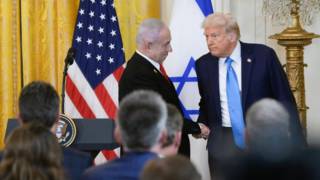
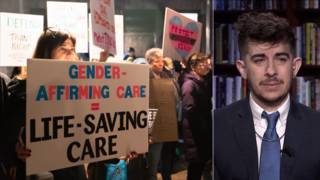
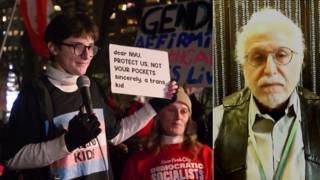
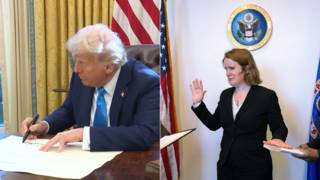





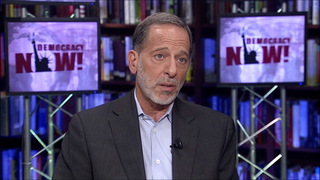
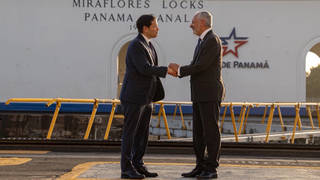
Media Options